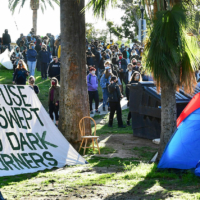
Corporate Landlords Sought to Profit During Last Economic Crisis, Study Finds Residential property acquisitions by LLCs soared during the Great Recession in Los Angeles’ working-class communities of color
By Les Dunseith
A recently released research brief from the UCLA Luskin Institute on Inequality and Democracy draws fresh attention to the manner in which corporate entities have sought to benefit from an economic crisis by rapidly acquiring residential property in Los Angeles.
The report builds on insights from several studies released during the COVID-19 pandemic by UCLA researchers that have found social and economic inequalities being reflected disproportionately in working-class communities of color. A significant percentage of residents in such communities face higher risk of unemployment, unsafe jobs, homelessness, and possible eviction and subsequent housing displacement.
The report analyzes data on the Great Recession, finding that corporate control of residential property in many working-class communities with large Black and Latino populations expanded significantly in Los Angeles County between 2005 and 2015. The report also develops case studies that focus on different types of corporate landlords that have been active in Los Angeles in recent years and their varied strategies to profit from the acquisition of distressed residential properties.
The study seeks to examine the geography of racialized risk in Los Angeles by focusing on working-class communities of color with high rent burdens, grouping data from 20 at-risk ZIP codes into four regions: South Central Los Angeles, the Koreatown/Westlake area, the Hollywood/East Hollywood area, and a portion of the San Fernando Valley that includes Van Nuys and North Hollywood.
Researchers focused on property acquisitions during the 10-year period in which the new owners are listed with the Los Angeles County Office of the Assessor as limited liability companies, or LLCs. Residential unit acquisitions by such LLCs increased significantly in the four regions in the wake of the Great Recession, peaking in 2012.
Referring to those acquisitions as “housing grabs,” the report finds that corporate control of residential property “is established and maintained through various strategies, including dominance in the single-family rental market, mass acquisition of foreclosed properties, destruction of rent-controlled housing, and running ‘eviction machines’ to displace tenants.”
“Who Profits From Crisis? Housing Grabs in Times of Recovery” is the title of the report issued Oct. 16 and written by Ananya Roy, director of the institute and a professor of urban planning, social welfare and geography; tenants rights activist Terra Graziani MURP ’19; Pamela Stephens, a doctoral student in urban planning; and Joel Montano, MURP ’20.
“Housing grabs are enabled by policies of deliberate deregulation, which also extend to financial lenders and the banking industry,” the authors write in the report. “Rewarded through bailouts and government-sponsored securitizations after the Great Recession, these real-estate and financial actors continue to be enabled in their profit-making on crisis.”
The report argues that action by public officials is needed to protect rent-burdened tenants in communities vulnerable to housing grabs, especially amid the pandemic. “Otherwise, there will be mass displacement of an unprecedented scale.”
A single property transaction can refer to the acquisition of a single-family home or an apartment building with several hundred units. The focus of the study was primarily on the number of units acquired through LLC transactions because the authors believe that figure best illustrates the scope of impact on a given community. During the period of study, data show a countywide increase in LLC transactions of 433% and a 121% increase in the number of units acquired. In 2015, for example, a total of 30,651 units were acquired through LLC transactions.
The four regions in the study have different housing stocks, the study notes, and thus a property sale in the San Fernando Valley, which has a higher share of single-family units, would likely have different meaning than would a sale in Koreatown/Westlake, which has significantly more high-unit apartment buildings.
The largest number of unit acquisitions through LLC transactions in any ZIP code in any year of the period of study was 735, which took place in the 90005 ZIP code of Koreatown in 2012. The Koreatown/Westlake region also had a significant spike in 2015 when 665 units were acquired by LLCs in the 90006 ZIP code, which is Pico Union.
South Central Los Angeles had the greatest overall increase in unit acquisition, at 388%, during the study period. Unlike the other regions, South Central had a fairly steady increase in units acquired through LLC transactions between 2007 and 2010, with a sharp increase and peak in 2011. Acquisitions were on the downswing after 2011 until another increase in 2015. This region’s change in unit acquisitions was greatest by far in ZIP code 90016 (West Adams), rising 2,757%.
The average number of units acquired through LLC transactions increased 201% overall during the study period in the region of the San Fernando Valley that was studied. The highest number of units, 550, in that region changed hands in the 91601 ZIP code (North Hollywood) in 2009.
The rise in units acquired in LLC transactions in the Hollywood/East Hollywood region was the least of the four at-risk regions studied, although still at 40% between 2005 and 2015.
The study was released at a time when the Los Angeles City Council and Mayor Eric Garcetti were considering how to respond to a legal challenge from the Apartment Association of Greater Los Angeles to the city’s moratorium on renter evictions amid the pandemic.
As director of the UCLA Luskin Institute on Inequality and Democracy, Roy joined with Paul Ong, director of the Center for Neighborhood Knowledge based at UCLA Luskin, in filing an amicus brief that argues against the landlord association’s effort to persuade a judge to issue a preliminary injunction that would suspend the moratorium on eviction for those renters who have experienced financial hardship during the pandemic.
“The proposed preliminary injunction threatens mass displacement in Los Angeles,” according to the amicus brief filed Oct. 9 in Los Angeles federal court. “Studies of COVID-19 impacts in Los Angeles show that most of this suffering will be concentrated in the city’s working-class communities of color, which are already bearing the burden of high infection and death rates.”
City leaders chose to fight back against the landlord association, and a U.S. District Court denied the motion for a preliminary injunction on Nov. 13, allowing Los Angeles’ eviction moratorium to remain in place.









Leave a Reply
Want to join the discussion?Feel free to contribute!